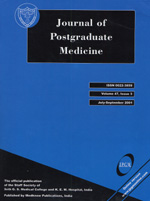
|
Journal of Postgraduate Medicine
Medknow Publications and Staff Society of Seth GS Medical College and KEM Hospital, Mumbai, India
ISSN: 0022-3859
EISSN: 0022-3859
Vol. 48, No. 2, 2002, pp. 153-154
|
 Bioline Code: jp02048
Bioline Code: jp02048
Full paper language: English
Document type: Research Article
Document available free of charge
|
|
|
Journal of Postgraduate Medicine, Vol. 48, No. 2, 2002, pp. 153-154
| en |
View Point - Tumour Induced Hydrocephalus and Oedema: Pathology or Natural Defence
Goel A
Abstract
The ventricular and subarachnoid cerebrospinal fluid (CSF) is the principal buffer system of the brain assisting in accommodating a mass lesion. An intra-axial tumour and its associated brain reaction in the form of cerebral oedema result in flattening of the gyri, obliteration of the subarachnoid cisterns and narrowing and displacement of the ventricles. In situations where the tumour obstructs the pathway of CSF flow 'obstructive hydrocephalus' is a result. Preoperative shunt surgery, temporary drainage of the CSF or diverting its flow has been advised in various situations. This procedure is done in an attempt to reduce the raised intracranial pressure and relieve the patient's symptoms, to normalise the altered cerebral blood flow and to 'relax' the brain, which would assist the surgeon in the definitive surgical procedure on the tumour. Although complications following the insertion of a shunt in supra- and infra-tentorial tumours have been occasionally reported, this issue has not been adequately discussed in the literature.
|
| |
© Copyright 2002 Journal of Postgraduate Medicine. Online full text also at http://www.jpgmonline.com
Alternative site location: http://www.jpgmonline.com
|
|
